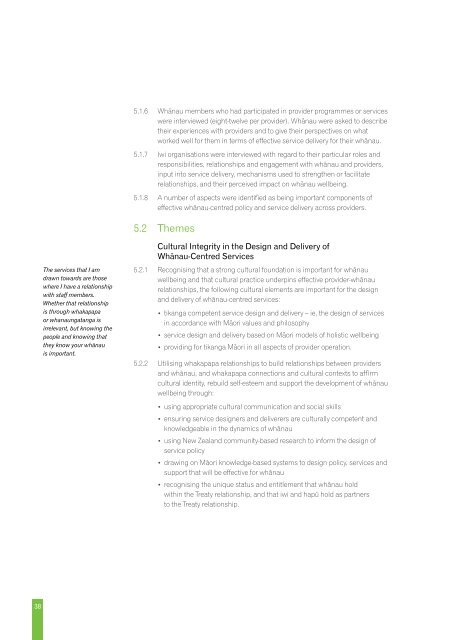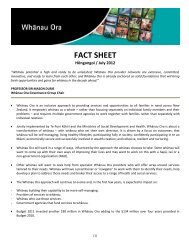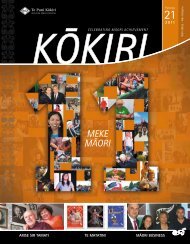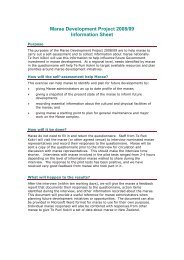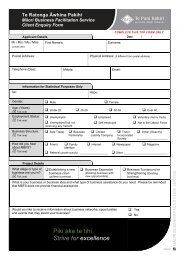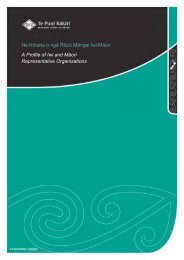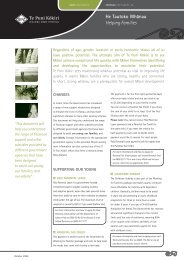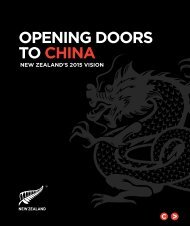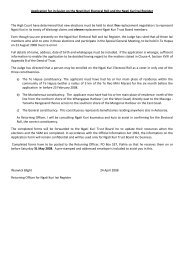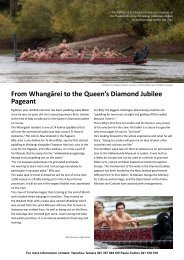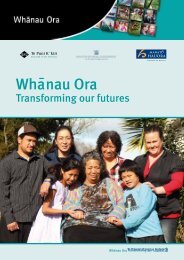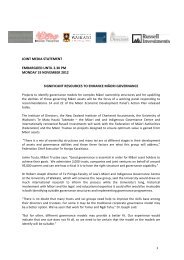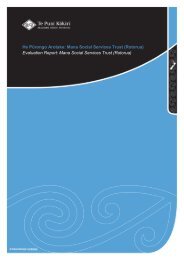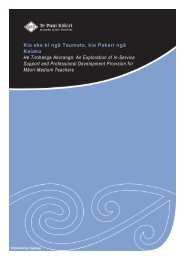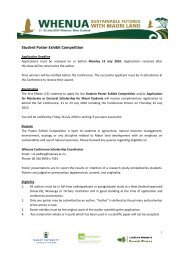Whanau Ora : Report of the Taskforce on Whanau-Centred Initiatives
Whanau Ora : Report of the Taskforce on Whanau-Centred Initiatives
Whanau Ora : Report of the Taskforce on Whanau-Centred Initiatives
Create successful ePaper yourself
Turn your PDF publications into a flip-book with our unique Google optimized e-Paper software.
5.1.6 Whānau members who had participated in provider programmes or services<br />
were interviewed (eight-twelve per provider). Whānau were asked to describe<br />
<str<strong>on</strong>g>the</str<strong>on</strong>g>ir experiences with providers and to give <str<strong>on</strong>g>the</str<strong>on</strong>g>ir perspectives <strong>on</strong> what<br />
worked well for <str<strong>on</strong>g>the</str<strong>on</strong>g>m in terms <str<strong>on</strong>g>of</str<strong>on</strong>g> effective service delivery for <str<strong>on</strong>g>the</str<strong>on</strong>g>ir whānau.<br />
5.1.7 Iwi organisati<strong>on</strong>s were interviewed with regard to <str<strong>on</strong>g>the</str<strong>on</strong>g>ir particular roles and<br />
resp<strong>on</strong>sibilities, relati<strong>on</strong>ships and engagement with whānau and providers,<br />
input into service delivery, mechanisms used to streng<str<strong>on</strong>g>the</str<strong>on</strong>g>n or facilitate<br />
relati<strong>on</strong>ships, and <str<strong>on</strong>g>the</str<strong>on</strong>g>ir perceived impact <strong>on</strong> whānau wellbeing.<br />
5.1.8 A number <str<strong>on</strong>g>of</str<strong>on</strong>g> aspects were identified as being important comp<strong>on</strong>ents <str<strong>on</strong>g>of</str<strong>on</strong>g><br />
effective whānau-centred policy and service delivery across providers.<br />
5.2 Themes<br />
The services that I am<br />
drawn towards are those<br />
where I have a relati<strong>on</strong>ship<br />
with staff members.<br />
Whe<str<strong>on</strong>g>the</str<strong>on</strong>g>r that relati<strong>on</strong>ship<br />
is through whakapapa<br />
or whanaungatanga is<br />
irrelevant, but knowing <str<strong>on</strong>g>the</str<strong>on</strong>g><br />
people and knowing that<br />
<str<strong>on</strong>g>the</str<strong>on</strong>g>y know your whānau<br />
is important.<br />
Cultural Integrity in <str<strong>on</strong>g>the</str<strong>on</strong>g> Design and Delivery <str<strong>on</strong>g>of</str<strong>on</strong>g><br />
Whānau-<strong>Centred</strong> Services<br />
5.2.1 Recognising that a str<strong>on</strong>g cultural foundati<strong>on</strong> is important for whānau<br />
wellbeing and that cultural practice underpins effective provider-whānau<br />
relati<strong>on</strong>ships, <str<strong>on</strong>g>the</str<strong>on</strong>g> following cultural elements are important for <str<strong>on</strong>g>the</str<strong>on</strong>g> design<br />
and delivery <str<strong>on</strong>g>of</str<strong>on</strong>g> whānau-centred services:<br />
• tikanga competent service design and delivery – ie, <str<strong>on</strong>g>the</str<strong>on</strong>g> design <str<strong>on</strong>g>of</str<strong>on</strong>g> services<br />
in accordance with Māori values and philosophy<br />
• service design and delivery based <strong>on</strong> Māori models <str<strong>on</strong>g>of</str<strong>on</strong>g> holistic wellbeing<br />
• providing for tikanga Māori in all aspects <str<strong>on</strong>g>of</str<strong>on</strong>g> provider operati<strong>on</strong>.<br />
5.2.2 Utilising whakapapa relati<strong>on</strong>ships to build relati<strong>on</strong>ships between providers<br />
and whānau, and whakapapa c<strong>on</strong>necti<strong>on</strong>s and cultural c<strong>on</strong>texts to affirm<br />
cultural identity, rebuild self-esteem and support <str<strong>on</strong>g>the</str<strong>on</strong>g> development <str<strong>on</strong>g>of</str<strong>on</strong>g> whānau<br />
wellbeing through:<br />
• using appropriate cultural communicati<strong>on</strong> and social skills<br />
• ensuring service designers and deliverers are culturally competent and<br />
knowledgeable in <str<strong>on</strong>g>the</str<strong>on</strong>g> dynamics <str<strong>on</strong>g>of</str<strong>on</strong>g> whānau<br />
• using New Zealand community-based research to inform <str<strong>on</strong>g>the</str<strong>on</strong>g> design <str<strong>on</strong>g>of</str<strong>on</strong>g><br />
service policy<br />
• drawing <strong>on</strong> Māori knowledge-based systems to design policy, services and<br />
support that will be effective for whānau<br />
• recognising <str<strong>on</strong>g>the</str<strong>on</strong>g> unique status and entitlement that whānau hold<br />
within <str<strong>on</strong>g>the</str<strong>on</strong>g> Treaty relati<strong>on</strong>ship, and that iwi and hapū hold as partners<br />
to <str<strong>on</strong>g>the</str<strong>on</strong>g> Treaty relati<strong>on</strong>ship.<br />
38


